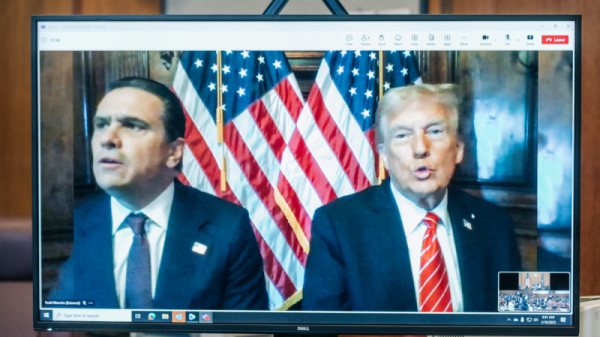A consequential development of the Trump era is what increasingly looks like the Republicans’ acrimonious divorce from the rule of law.
The party that once prided itself as the law-and-order side has leaped headlong into highly speculative theories about the “weaponization” of the justice system, spurred by former president Donald Trump. Both Trump and his former lawyer Rudy Giuliani recently flouted civil defamation verdicts against them by continuing to defame their victims — cheered on by many on the right. Republican voters increasingly want a president who is willing to break both rules and laws to get things done.
But some members of the party have in recent days crossed a new threshold: by suggesting that it’s okay to disregard the Supreme Court.
After the Supreme Court ruled last week that federal authorities can remove razor wire that Texas put on the U.S.-Mexico border, Rep. Chip Roy (R-Tex.) posted on X, formerly Twitter, that “Texas should ignore it.”
“It’s like, if someone’s breaking into your house, and the court says, ‘Oh, sorry. You can’t defend yourself.’ What do you tell the court?” Roy separately told Fox News. “You tell the court to go to hell, you defend yourself and then figure it out later.”
By Friday, Oklahoma Gov. Kevin Stitt (R) had gone on CNN and indicated that it would be okay to disregard the Supreme Court in certain circumstances.
“We all agree that the Constitution is the supreme law of the land,” Stitt said. “And if the Supreme Court gets something wrong — for example, if they tried to ban and say that we didn’t have a Second Amendment right to bear arms — I think the Constitution supersedes somebody in Washington, D.C., telling us, you know.”
Stitt didn’t seem to finish the thought (and his office hasn’t responded to a request for comment), but the thrust of what he was saying is pretty clear. Host Jake Tapper’s question was about “whether elected officials should just ignore rulings from the U.S. Supreme Court with which they disagree,” and Stitt’s response was decidedly not “no.”
Stitt’s comments also came after he had spent a day repeatedly floating a scenario in which members of the National Guard might disobey orders from their commander in chief, the president of the United States. Stitt repeatedly cited the difficult decisions those Guard members would face if President Biden tried to federalize them. (Biden has the authority to do so, though such authority has rarely been invoked, and the White House has not signaled it’s in the works.) Stitt suggested they might be standing on principle by refusing Biden’s orders.
It’s important to note that, despite the claims of some on the left, what Texas Gov. Greg Abbott (R) is doing right now doesn’t violate what the Supreme Court ruled.
The court overturned a ruling that said the federal government couldn’t remove the razor wire, effectively allowing it to do so; Abbott has signaled he’ll continue to have the National Guard lay the wire, and Texas Attorney General Ken Paxton (R) has rejected the Biden administration’s request for full access to the area.
Provocative? Yes. Interfering with federal authority? Quite possibly. But directly violating the Supreme Court’s decision? No.
Roy’s and Stitt’s comments, then, take this debate quite a bit further.
In some ways, it’s a logical extension of the emerging Republican argument about state sovereignty. Anticipating a federal-vs.-state clash, Republicans have taken to arguing that Texas has the authority to defend itself from those crossing the border illegally.
But you can also see how we’re getting into dicey territory here. The Supreme Court is the institution we charge with interpreting our Constitution; we now have a sitting U.S. governor and a congressman suggesting it’s okay to ignore what the court says if you have a different interpretation. (Tapper noted to Stitt that Democratic governors could seemingly do the same in restricting gun rights beyond what the court says is constitutional — by arguing that it’s just that important to protect their citizens.)
The Roy and Stitt comments come after Alabama Republicans last year flouted a Supreme Court order regarding the state’s congressional map. The court had upheld a lower-court ruling that required a second district “in which Black voters either comprise a voting-age majority or something quite close to it.” The resulting district was just 40 percent Black. The lower court again rejected it, saying it was “not aware of any other case in which a state legislature” declined to abide by such an order. The Supreme Court again upheld that ruling.
It’s quite possible we’ll never have a situation in which Texas officials or the National Guard actually have to decide between what they argue is their duty and what the Supreme Court says.
But these kinds of comments certainly lay the rhetorical groundwork for a pretty unthinkable future clash — especially given they come from a party that has demonstrated increasingly little regard for the current application of the rule of law.





























